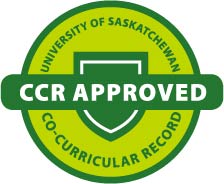
Co-Curricular Record Advisory Committee: Terms of Reference
Background
Co-curricular records are quickly becoming best practice at North American colleges and universities (Elias 2014). Employers are looking for well-rounded candidates with demonstrated competencies, skills and engagement beyond their academic coursework (Causer, 2009). A co-curricular record at the University of Saskatchewan documents student learning activities and learning outcomes that occur outside of regular academic coursework. These activities and their learning outcomes are recognized on an official document that students can then use in furthering their employment and educational goals.
A component of the University of Saskatchewan’s CCR program is establishing an advisory committee to assist and guide the development and growth of the program.
Advisory Committee Mandate
The University of Saskatchewan’s Co-Curricular Advisory Committee is responsible for developing the philosophy and broad framework for inclusion of activities within the Co-Curricular Record. The Committee will consult all necessary campus stakeholders, community partners and best practice research when constructing their recommendations.
The Advisory Committee maintains the institutional integrity of CCR through high level strategic policy direction, advocates at the institutional level for CCR, monitors internal and cross-institutional best practices, and reports to the Teaching, Learning and Academic Resources Committee (TLARC).
Scope and Authority
The focus of the Co-curricular Record Advisory Committee is to provide guidance and recommendations for building a University of Saskatchewan co-curricular program that supports the student experience across all program areas.
Responsibilities of the Committee include:
- annual approval of the guiding principles to ensure correlation of CCR learning outcomes and activity criteria related to Learning Charter Core Learning Goals
- review the operations of the co-curricular record annually (metrics and statistics related to usage and oversight)
- provide guidance and support to Colleges, departments and units as required
- provide advice for expansion of the program on and off campus
- annually elicit feedback from colleges, students, and end-users (potential employers etc.), on the value, purpose and usage of the CCR for the purpose of continuous enhancement of the record and associated processes.
- annually review and audit the validation process of student activities
- annually review the training manuals and resources available to administrators and validators
- annually review marketing and communication strategies
Operations
- The committee will meet at least once during the Fall and Winter terms and/or at the call of the Chair. The Committee will select a Chair and review membership as required.
- CCR Advisory Committee SharePoint site has been developed as a central repository for meeting agendas and minutes and other related documentation - https://share.usask.ca/go/vptl/cs/CCRAdvisory
- The committee will be informed of any Orbis contract and budgetary implications that arise in Information and Communication Technology (ICT) or the University Registrar’s Office that will affect the operations of the CCR
- The Manager & Associate Registrar (Student Central) will be the central contact for CCR and administrator of CCR SharePoint site
- A Senior Specialist in Academic and Research Technologies from ICT will provide support with operation and maintenance of Orbis software, system access, training and CCR contact lists
Reporting
The Advisory Committee will approve reporting protocols and provide ongoing recommendations and updates on the CCR program to the Teaching, Learning and Academic Resources Committee (TLARC).
Membership
The Advisory Committee is made up of representatives from college faculty, university administrative professionals and student governance executives.
University Registrar
Director, Academic & Research Technologies
Director, Teaching and Learning Enhancement
4 College Associate Deans representing both direct entry and non-direct entry Colleges
1 representative each from USSU and GSA
Associate Registrar, Student Central
Executive Sponsor
Vice-Provost, Teaching, Learning and Student Experience